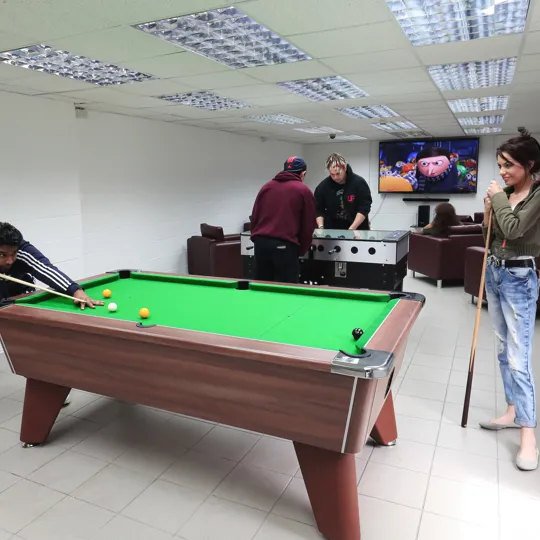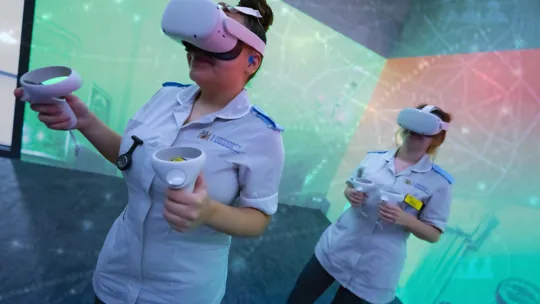June 2025
Blog | The 9 things we wish we knew before starting university
By Sean Madden
Share post:Read time: approx 6 mins
Starting university can be daunting. You might be moving away from home, living with people outside your family for the first time, and navigating new topics and a new campus.
From staying organised to looking after our wellbeing, there’s a lot we wish we’d thought about before starting our degrees, so we’ve put together a list of the most important bits of advice.

1. The importance of budgeting
This is especially true if you are living away from home. After all, student loans are called so for a reason – you have to pay it back!
When you arrive at university, our award-winning student support services can also help you keep your spending on track, and you may also be eligible for our Kick-Start Scheme funds or free 5K, so check out the financial support options available to you.

2. Get work experience as soon as possible
Your time at university is a safe space to try new things, learn on the job, and earn some extra money too!
Once you arrive on campus, why not speak with the Hired team? They have a wide variety of resources to help you find the job, placement, or work experience that suits you.

3. Find your course’s social media groups
If your course has a social media page, forum or other online community, it’s worth joining it to get the latest updates on what’s happening on your course specifically. It can serve as a notice board for any additional lecture notes, coursework and exam deadlines, work opportunities and much more!

4. You don’t have to go out all the time – or drink alcohol
Student life is synonymous with party culture. If you’re not a party person and don’t enjoy alcohol, it can feel like you’re missing out on bonding with other students.
University life doesn't need to be like that! Seek out events that fit your personality. You can attend or put on alternative gatherings such as meals, games, and other activities that don’t involve staying out to the early hours.
They're a great way to meet friends beyond your dorm or your course, and while we're on the subject...

5. Make the most of extra-curricular activities
Being at university gives you a great opportunity to get involved in a host of activities outside of study and work, often with like-minded people holding similar interests to yours.
You can find volunteering opportunities or internships, join any number of student societies, or play on one of our many sports teams.
Check out the Guild to see the full range of activities available and make the most of your university experience.

6. Manage your time and energy
The transition from college to university can be tough, so it's really important to track your workload and stay on top of deadlines while making sure you have time for yourself.
This can be an art form, but it’s totally possible. If you know you have a full day of lectures or workshops, ensure your evening is filled with relaxing or low-stress activities. Alternatively, if your day is a bit lighter, you can afford to do something a bit more active or energy intensive.

7. Don’t skip lectures in your first year because your grades ‘don’t count’
This is one we've all heard, and it's all too easy to fall into the trap of ‘living the student life’ and not taking your studies seriously from day one.
While it’s true that most courses don’t count your first year into your final grade, if you build a habit of complacency, you’ll find it difficult to knuckle down in your second year.

8. Look after your mental and physical health
While you study it's almost inevitable that there'll be times of doubt and stress, and you might feel overwhelmed. These feelings are completely normal and are often a temporary response while you adjust to a new situation.
It's really important to take time for yourself, take a break from work and do something fun, preferably with some exercise involved if you're able to, and eat well.
Talk to friends, family, or staff if these feelings persist, and remember you can always take advantage of our award-winning student support and counselling services if you need to.

9. Use the University’s resources and look for second hand course materials
Course materials can be quite expensive, especially when you first start. Take a look at your reading list and see if you can find these online through second-hand sites for less, or ask your lecturer if they can direct you to forums or online groups where you can get these materials from soon-to-be graduates from your course.
Alternatively, our library at Baskerville House has an extensive range of books and you will have access to an online collection of more than one million resources.
Use the most of these to ensure your work is as good as can be, or to simply try out new ideas as part of your course.
These resources will usually be signposted to you, but it’s up to you to really make full use of them.
Found this blog useful? For more on how we support our students, explore our award-winning Support Services
You can also check out our blog on budgeting
Check out our latest news stories

University excels across multiple areas in National Student Survey 2025
The University’s commitment to continual improvement has been recognised in the latest round of results from the UK’s l…
Read more
Business School’s excellence recognised with CABS membership
The Business School is delighted to announce it has attained full membership of the Chartered Association of Business Schools.
Read more
University’s “future-ready” health education to drive delivery of 10-year NHS plan
University College Birmingham’s new learning and teaching strategy is set to play a critical role in meeting…
Read more
Chelmsley Wood culinary school makes its mark
Chelmsley Wood culinary school hoardings revealed.
Read more
MP visit champions collaboration as key to changing outcomes for young people
Sarah Smith MP visit champions collaboration as key to improving outcomes for young people.
Read more
Blog | The 9 things we wish we knew before starting university
From staying organised to looking after our wellbeing, there’s a lot we wish we’d thought about before starting our degrees, so…
Read more